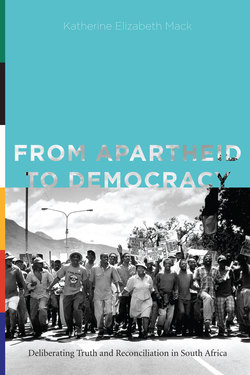Читать книгу From Apartheid to Democracy - Katherine Elizabeth Mack - Страница 9
На сайте Литреса книга снята с продажи.
ОглавлениеACKNOWLEDGMENTS
This book has been a long time in the making. Without Susan Jarratt’s mentoring, endless encouragement, and incisive comments, I wouldn’t have finished my PhD, let alone become a professor and published this monograph; I owe her my biggest debt of gratitude. With patience, humor, and tact, Steve Mailloux pushed me to be more theoretically sophisticated and precise; he also convinced me that everything is indeed rhetorical. I thank Inderpal Grewal for asking tough questions and building my confidence as a scholar. A special thank you also to Alexandra Sartor, a lively interlocutor, thoughtful reader, conference companion, and, not least, a steadfast friend. Many others at UC Irvine helped along the way, especially Jonathan Alexander, Amitabha Bagchi, Paul Dahlgren, Philomena Essed, David Theo Goldberg, Daniel Gross, Lynda Haas, Laura Knighten, Jane Newman, and Piper Walsh. My writing partners, Matthew Pearson and Alexandra Sartor, consistently provided thoughtful feedback.
For transformative conversations about matters intellectual, professional, and personal, I owe an enormous debt of gratitude to Marjorie Jolles and Shevaun Watson. You two provide different and wonderful models of what it means to be scholars, teachers, and administrators. You are also always one step ahead of me, making my path through academia (and life) that much easier.
Over the years, workshops and panels with John Ackerman, Jim Beitler, Robert Hariman, John Lucaites, Kendall Phillips, Mitchell Reyes, Susan Romano, Patrician Stevens, and Bradford Vivian helped me refine my thinking about the relationship between rhetoric and public memory. An internship with the International Center for Transitional Justice under the direction of Louis Bickford and conversations with Priscilla Hayner gave me a practitioner’s perspective on the field of transitional justice and South Africa’s TRC’s influence on its development. I am grateful to Jillian Edelstein, Carnita Ernest, Cecyl Esau, Terry February, George Hallett, Oupa Makhamelele, and Njabulo Ndebele, who generously allowed me to ask questions about their work and their vision for the new South Africa.
For doling out criticism and encouragement in equal measure, Jeffrey Montez de Oca and Stephany Spaulding, my friends and writing partners at UCCS , deserve special mention. I thank the entire English department, especially Traci Freeman, Ceil Malek, Michelle Neely, Kirsten Ortega, and Ken Pellow, for their support. I also wish to thank Christina Martinez, who has yet to deny a request to purchase materials for UCCS’s Kraemer Family Library. A grant from the Committee on Research and Creative Work and the office of LAS Dean Peter Braza provided additional material support.
Anonymous reviewers provided feedback that greatly improved this manuscript. I am grateful for their thoughtful and generous revision suggestions, which I have incorporated to the best of my abilities. I also thank Kendra Boileau and Cheryl Glenn for their support of this project and superb editorial guidance. I extend my gratitude to Laura Reed-Morrisson and to the rest of the staff at Penn State University Press whose work made this book possible.
Relationships outside of the academy sustained me throughout the long gestation of this project. In different ways, Cathy Costello, Marcela Díaz, Andrew Dibben, Henrik Fett, Jack and Cynthia Goldberg, Candace and Ryan Hewitt, Kristy Mack-Fett, Cindy Maguire, Rob McCallum, Bryan McGlynn, Priti Patel, Cancion Soto, John Standish, and Mariann Youmans have kept me afloat. Dominik and Tatiana Fett, you are a constant source of delight. My parents—Karin and Ed Costello, Alan Mack, and Deena Goldstone—nurtured my curiosity and supported my passions from the very beginning. Finally, Minette and Owen Church brought Andrew Agustín into my life: words can’t capture my gratitude.
